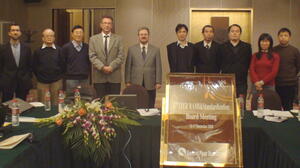RAMI or failure is not an option
RAMI stands for reliability, availability, maintainability and inspectability. It describes a process whose primary purpose is to make sure that all the systems of the ITER machine will be reliable during the operation phase and maintain their performance under operational conditions with the best possible availability. Failure of only one small function might result in the machine being halted for long periods of time and result in high costs for repairs and replacements. It is therefore important that every system undergoes a technical risk analysis to evaluate WHAT can go wrong, WHERE and WHEN, and to recommend spare components, back-up systems, increased frequency maintenance schedules, component standardization, systems design optimization, etc. to reduce the risk level of a main function breakdown to a minimum and to decrease the time to repair to a maximum.
Recently, representatives of the ITER Organization and the Domestic Agencies attended the 5th meeting of the RAMI & Standardization Board which was sponsored by the Chinese Domestic Agency and held in Xi'an, the home of the famous army of terracotta warriors buried more than 2,200 years ago by Qin Shi Huang, first emperor of China. Remote participants joined the meeting from Korea and Cadarache.
One of the goals of this 5th meeting was to review the progress made within the RAMI program. During 2009, ten analyses had been carried out and completed, bringing the total number of analyzed systems to 17. The results of these analyses have been put into optimization of the design and preparation of the testing and maintenance, spare parts policy, and operation procedures. The Board members expressed their opinion that the ITER RAMI approach is particularly effective for the reduction of potential technical risks of ITER subsystems, components, and even of the whole ITER machine. The Board members were very satisfied with the results obtained in 2009 which exceeded objectives. They underlined their support to the ITER RAMI program and agreed with the priorities proposed by the ITER Organization for this year: RAMI analysis of the divertor, blanket, diagnostics for basic plasma control and equipment protection, and access control and radiological monitoring.
The Board expressed appreciation for the considerable standardization activities that have been achieved and especially those related to the low and medium voltage electrical motors which are used to operate many ITER systems. The Board recommended maintaining the standardization of sensors/connectors and electrical distribution components as a high priority.
Finally the board recommended that the ITER Organization develops and maintains, in collaboration with Domestic Agencies, a database gathering all the existing data related to the failure frequency (rate) of components used in fusion devices.
The Board concluded its 5th meeting with a renewed commitment to continue supporting the RAMI and standardization programs at ITER to ensure that ITER meets its operational objectives.


